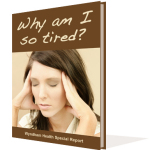
Well, yes it is all that, and a lot more. It is the environment we live in the food that we eat, the water that we drink, the stress that we have to cope with and the activities that we do.
Here are 7 reasons that you may feel tired.
1. Food sensitivities
A very common reason for tiredness is that you are suffering from a sensitivity to something that you are eating. The one thing that the majority of people say to me having taken the foods that they are sensitive to, out of their diet, is that they have so much more energy. It is probable that we all have a propensity for food sensitivities but if we are healthy, have no stresses and life is great, our bodies will cope. The minute our immune system becomes compromised and we become stressed, we start to react to foods, and usually those foods that we eat on a regular basis. It is said that ‘we are what we eat’, yes, this is very true but more importantly ‘we are what we absorb’. To prevent food sensitivities we require good absorption qualities in the gut.
The gut has many functions:
• digests food,
• absorbs small food particles to be converted into energy,
• vitamins and minerals attached to carrier proteins are taken across the gut lining into the blood stream
• helps to detoxify the body
• contains antibodies that act as the first line of defence against infections
When the absorption becomes compromised the lining of the gut becomes a colander rather than a sieve, with larger holes allowing bacteria, toxins and food to leak through into the body. Large food antigens are foreign to the body’s defence system, so it attacks them resulting in the production of antibodies against once harmless foods, and then a food sensitivity develops. Also when the intestinal lining is damaged the carrier proteins that take the vitamins and minerals across become damaged resulting in a vulnerability of the person to vitamin and mineral deficiencies and therefore tiredness.
There are many factors that can increase the permeability of the intestinal wall such as alcohol and caffeine, drugs especially antibiotics, anti-inflammatories and antacids, food additives, diets high in refined carbohydrates and stress.
2. Diet.
If we constantly eat cooked, processed food, our body, which produces around 22 enzymes that work on all the different foods, is forced to supply all of the enzymes needed to digest that food and this requires a lot of energy. It is for this reason that we may feel tired after eating a meal. Eventually our body will use up its ability to produce enzymes and this causes fatigue as well as many other symptoms
3. Vitamins and Minerals.
Unfortunately even high energy foods do not give us all the vitamins and minerals that we need. Fruit and vegetables are picked way in advance of being ripe so that they do not get the benefit of the soil; fertilisers and pesticides leach any minerals from the soil, and then the vegetables and fruit are stored and sprayed to make them look good and last longer on the shelf. A cereal bowl of spinach in 1948 would have given 150mg of iron; the same bowl today gives us 2mg! Just like our car needs the right petrol for it to run properly, we need the right vitamins and minerals to stop us becoming tired.
4. Acid/Alkaline balance.
It is so important that you eat lots of green organic vegetables to keep your body alkaline. According to Dr Robert Young of the pH Miracle, ‘the more alkaline foods that you eat, the more alkaline your body will be, and the more energy you will have’. All complex carbohydrates, sugars, sweeteners, tea, coffee, animal protein and some fruits are acidic or have acidic effects on the body. What then happens is that the acidity interferes with the healthy red cell production. The red blood cells become damaged by the acid and clog together so that there is less oxygen to the body cells and therefore the body becomes tired.
5. Blood Sugar.
Why do I recommend cutting out all sugars, processed foods, tea and coffee? Because these foods are stimulants; they push our blood sugar up and give us a false sense of energy! A common reason for tiredness is a transient blood sugar.
When we eat carbohydrates and sugar they pass through the walls of the digestive tract and enter the bloodstream, the blood sugar level rises. This causes the pancreas to make insulin which ‘pushes’ the sugar out of the blood and into the muscles where it provides energy for all our daily tasks and activities. With the help of just the right amount of insulin the blood sugar level drops down again to normal level and everything is balanced – supposedly.
The aim is to prevent sudden large increases in blood sugar levels so that excessive unnecessary amounts of insulin are not produced, sending the blood sugar levels abnormally low. This is when you feel tired. Steady blood sugar levels can be readily achieved by changing from high to low glycaemic index foods. Studies have revealed that different carbohydrate foods have different effects on blood sugar levels and this is known as the glycaemic index. This is a ranking of foods from 1-100 that tells us whether a food will raise blood sugar levels dramatically, moderately or just a little. Many foods such as bread and potatoes are digested and absorbed very quickly, sending the blood sugar level sky high, whereas most fruit and vegetables keep the levels steady. Stimulants like tea, coffee, chocolate, alcohol and stress can also increase the blood sugar level.
Glucose is needed as an essential fuel for the body, especially the nervous system, but we do not need to eat glucose. It should enter our bodies as an integral part of various unrefined and complex carbohydrates, gradually being broken down step by step. It is also available by the conversion of glycogen stored in the liver.
Some of the symptoms that we may experience with a drop in blood sugar are fatigue, thirst, frequency of urination and panic attacks.
6. Dehydration.
The human body is 70% water. It makes up 75% volume of our muscles and heart, 83% of our brain and kidneys, 86% of our lungs and 95% of our eyes. If we do not drink enough we will compromise our body and our health. One of the greatest causes of daytime fatigue is lack of water. Water increases the oxygen in the blood and maintains normal electrical properties of the cells improving cell to cell communication. Without it, cells lack communication.
So it is very important that you drink at least 1-2 litres of plain water a day to prevent tiredness.
7. Deep breathing.
Breathing is not something we have to think much about, it happens automatically, but how many of us breathe deeply enough? If we look at the shape of our lungs we have a much greater capacity in the lower part of our lungs, so to get more oxygen into the blood and therefore the body, we need to get air right to the bottom of our lungs.
Breathing is the bridge between body and soul and oxygen is the elixir of life. Germs and disease cannot live in an oxygenated environment so it is important to fill our cells with oxygen.
A great exercise that helps you to do this is ‘power breathing’. Breathe in through your nose to a count of 4, hold for a count of 20 and breathe out for a count of 10. Repeat this 3 times and several times a day.
